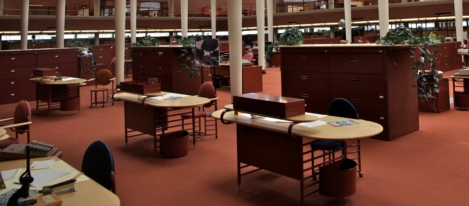June 10, 2015
Time to get back a sense of proportion about sitting down
 The well of public discourse about office design is regularly fouled by the effluent of people who really should know better. Normally this is characterised by hyperbolic assertions about how flexible working will lead to The Death of the Office (it won’t) or how the decision by Yahoo and others to go into partial reverse on remote work would spell The Death of Flexible Working (it didn’t). All of this drivel can be forgiven when it comes from civilians, but the fact that it remains commonplace in the workplace media and emanates from the mouths of people who work in the sector is enough to make you despair. The latest example of this attention seeking behaviour, excretion of simplistic bullshit, market making or whatever you see it as, is the drive to demonise sitting, now normally expressed alongside some variant of the slogan ‘Sitting is the New Smoking’.
The well of public discourse about office design is regularly fouled by the effluent of people who really should know better. Normally this is characterised by hyperbolic assertions about how flexible working will lead to The Death of the Office (it won’t) or how the decision by Yahoo and others to go into partial reverse on remote work would spell The Death of Flexible Working (it didn’t). All of this drivel can be forgiven when it comes from civilians, but the fact that it remains commonplace in the workplace media and emanates from the mouths of people who work in the sector is enough to make you despair. The latest example of this attention seeking behaviour, excretion of simplistic bullshit, market making or whatever you see it as, is the drive to demonise sitting, now normally expressed alongside some variant of the slogan ‘Sitting is the New Smoking’.







































June 25, 2015
Long distance commuting, agile working and dinosaur extinction in the UAE
by Douglas Langmead • Cities, Comment, Flexible working, Property
More →